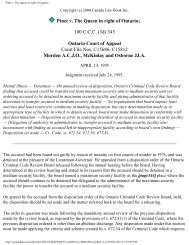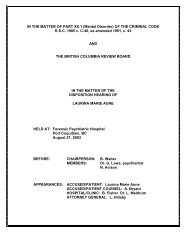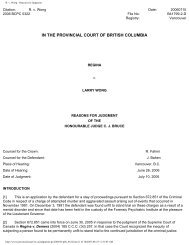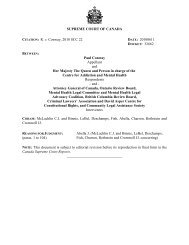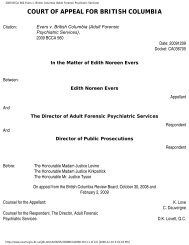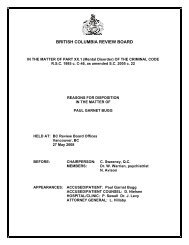R. v. Cuerrier - British Columbia Review Board
R. v. Cuerrier - British Columbia Review Board
R. v. Cuerrier - British Columbia Review Board
You also want an ePaper? Increase the reach of your titles
YUMPU automatically turns print PDFs into web optimized ePapers that Google loves.
R. v. <strong>Cuerrier</strong><br />
designed to protect property interests, than it is for sexual assault, which is one of the worst violations of<br />
human dignity?<br />
20 Finally, my colleagues' examples of the types of trivial conduct that will be caught by this<br />
approach are grossly overstated. Cory J. downplays the limiting effect of the fact that a causal<br />
connection must be proven, to the imposing criminal standard, between the accused's dishonest act and<br />
his intention to induce the submission of the complainant. For instance, a mere misrepresentation as to a<br />
man's professional status, without proof that the man was aware that the complainant was submitting to<br />
sexual intercourse with him by reason of his lie, would not constitute sexual assault. See Mewett and<br />
Manning, supra, at pp. 789-90. Whether a complainant actually submitted to sexual intercourse by<br />
reason of an accused's fraud will necessarily depend on an examination of all of the factors, and can only<br />
be decided on a case-by-case basis.<br />
21 McLachlin J.'s predictions are even more cataclysmic. Contrary to her assertion in para. 52, it is<br />
not "any deception or dishonesty" that will be criminalized by this approach. McLachlin J. argues that<br />
based on the approach to fraud that I have explained, henceforward the "implied consent inherent in the<br />
social occasion -- the handshake or social buss -- are transformed by fiat of judicial pen into<br />
crimes". But my approach to fraud will in no way catch such innocent conduct. The very notion of<br />
implied consent to touching that is inherent in the social occasion, and indeed, inherent in so many<br />
aspects of day to day life, is based on an understanding of social realities and a need for tolerance of a<br />
reasonable degree of incidental and trivial contact. Whether or not a man is wearing a false moustache or<br />
a woman, alluring make-up, it is inconceivable that the Crown, were it foolish enough to prosecute a<br />
case of assault by handshake or social buss, would be capable of establishing beyond a reasonable doubt<br />
both that a complainant only consented to the physical contact by reason of the deception, and that the<br />
deception was employed with the knowledge and intention of inducing the submission of the<br />
complainant. In addition, the principle of de minimis non curat lex, that "the law does not concern itself<br />
with trifles" might apply in such a case: see R. v. Hinchey, [1996] 3 S.C.R. 1128, at para. 69, per<br />
L'Heureux-Dubé J. Furthermore, I cannot accept McLachlin J.'s criticism that the test suffers from<br />
imprecision and uncertainty due to the fact that the dishonesty of the act is to be assessed based on an<br />
objective standard. A majority of this Court has already accepted such an approach to the assessment of<br />
the dishonesty of the act in the criminal fraud context: see Théroux, supra, at p. 16, per McLachlin J.<br />
22 Since Parliament has, through the assault provisions, granted broad protection to individual<br />
autonomy and physical integrity in order to guard everyone's right to decide under what conditions<br />
another may touch them, it is not for this Court to narrow this protection because it is afraid that it may<br />
reach too far into the private lives of individuals. One of those private lives presumably belongs to a<br />
complainant, whose feeling of having been physically violated, and fraudulently deprived of the right to<br />
withhold consent, warrants the protection and condemnation provided by the Criminal Code.<br />
23 Subject to these reasons, I agree with my colleagues' disposition to allow the appeal and order a<br />
new trial.<br />
http://ql.quicklaw.com/qltemp/C2KEwCMAFbZMTYcs/00011scr-00019415%2ehtm (14 of 44)2007-08-21 1:18:15 PM



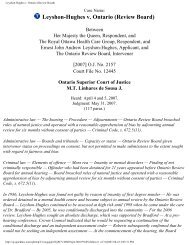
![LaFortune [LaFortunate] (Re) - British Columbia Review Board](https://img.yumpu.com/42779845/1/190x245/lafortune-lafortunate-re-british-columbia-review-board.jpg?quality=85)
